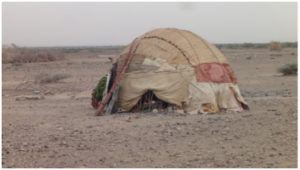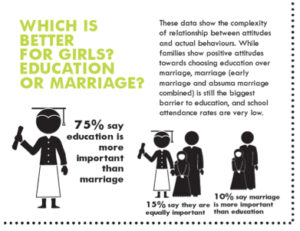This article appeared in the American Evaluation Association’s Feminist Issues in Evaluation Interest Group’s Newsletter on July 9, 2015 and is being republished here.
In the PAGES project for Girlhub Ethiopia, in March 2014, we explored community attitudes about girls’ education. The Afar region of Ethiopia is predominantly desert; the population is predominantly Muslim and nomadic. Most Afar people live in mobile homes made of sticks, mats, and plastic covers that are gathered into a bundle when it’s time to move.

The overall evaluation was a randomized control trial that included 3000 participants. The surveys and interviews in the overall evaluation revealed that the community had very positive attitudes towards education. When asked if children were “in school” most parents and most children said yes. School enrollment is mandatory in Ethiopia.
A subset of 100 girls and 100 female caregivers participated in our exploratory study using SenseMaker’s mixed-method storytelling methodology. Grounded in complexity theory (Cynefin Framework), SenseMaker uses more indirect and complex response items to help identify contradictions and complexity.
Here are some:
- While 75% of girls said they were “in school” only 25% attended 5 days a week.
- While 75% participants say that education is more important than marriage to improve a girls’ life, 77% of girls and 57% of caregivers say that child marriage is a barrier to girls’ education.
- While chores (which include walking 5-10 km a day to fetch water) are listed as the biggest barrier for girls’ education (84% of girls and 82% of caregivers say so). Many participants (32%) say that the family’s beliefs about education determine whether a girl goes to school.
When asked who benefits from a girls’ education, the camp is split. Some say it benefits equally the girl, the family, and the community.

Many saw it benefitting the girl first, her family at a later date, and only minimally and in the long term, the community. This perception of long-term gain over short-term gain may explain the gap between attitudes and behavior, between school enrollment and actual attendance. If you had no water to drink today, would long-term gain drive your decisions? One of the recommendations made to PAGES was to add to the school curricula topics that provide helpful information for the family and the community in the short-term, given the challenges of the Afar region.
An infographic summary of results is available online on the Fierro Consultingwebsite. The full report will be available on the Girlhub Ethiopia’s website and the Fierro Consulting website in Fall 2015.

Photo courtesy of Girlhub Ethiopia ©2013

